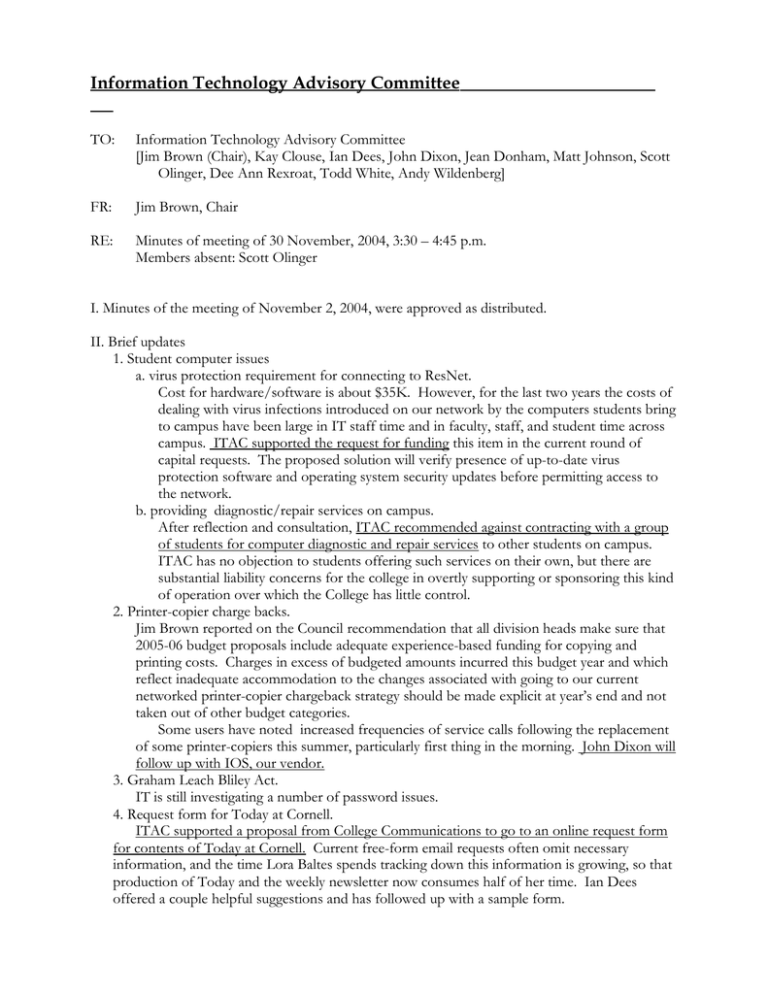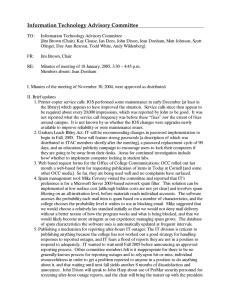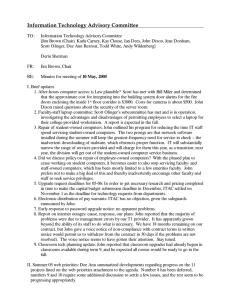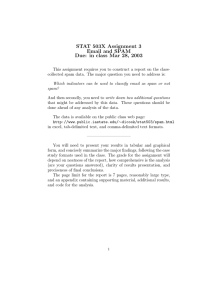Information Technology Advisory Committee
advertisement

Information Technology Advisory Committee TO: Information Technology Advisory Committee [Jim Brown (Chair), Kay Clouse, Ian Dees, John Dixon, Jean Donham, Matt Johnson, Scott Olinger, Dee Ann Rexroat, Todd White, Andy Wildenberg] FR: Jim Brown, Chair RE: Minutes of meeting of 30 November, 2004, 3:30 – 4:45 p.m. Members absent: Scott Olinger I. Minutes of the meeting of November 2, 2004, were approved as distributed. II. Brief updates 1. Student computer issues a. virus protection requirement for connecting to ResNet. Cost for hardware/software is about $35K. However, for the last two years the costs of dealing with virus infections introduced on our network by the computers students bring to campus have been large in IT staff time and in faculty, staff, and student time across campus. ITAC supported the request for funding this item in the current round of capital requests. The proposed solution will verify presence of up-to-date virus protection software and operating system security updates before permitting access to the network. b. providing diagnostic/repair services on campus. After reflection and consultation, ITAC recommended against contracting with a group of students for computer diagnostic and repair services to other students on campus. ITAC has no objection to students offering such services on their own, but there are substantial liability concerns for the college in overtly supporting or sponsoring this kind of operation over which the College has little control. 2. Printer-copier charge backs. Jim Brown reported on the Council recommendation that all division heads make sure that 2005-06 budget proposals include adequate experience-based funding for copying and printing costs. Charges in excess of budgeted amounts incurred this budget year and which reflect inadequate accommodation to the changes associated with going to our current networked printer-copier chargeback strategy should be made explicit at year’s end and not taken out of other budget categories. Some users have noted increased frequencies of service calls following the replacement of some printer-copiers this summer, particularly first thing in the morning. John Dixon will follow up with IOS, our vendor. 3. Graham Leach Bliley Act. IT is still investigating a number of password issues. 4. Request form for Today at Cornell. ITAC supported a proposal from College Communications to go to an online request form for contents of Today at Cornell. Current free-form email requests often omit necessary information, and the time Lora Baltes spends tracking down this information is growing, so that production of Today and the weekly newsletter now consumes half of her time. Ian Dees offered a couple helpful suggestions and has followed up with a sample form. III. Service Outage issues 1. The IT staff recommended categories of outage and appropriate IT response by category, including 24/7, 12/7, and next business day response windows. After some discussion, and the addition of the library server to the listed categories, the IT proposal was approved with thanks from the committee for the service-oriented analysis. The amended proposal will be available on the IT web page. 2. A contact strategy for informing community members about outages and outage recovery status was discussed. Conversation centered on various capabilities of the college’s voice messaging system and on the degree of use of campus voice mail by students and others. Ian Dees is to talk with Dan Davies, telecommunications technician, about a number of strategies and will report at the meeting of January 11, 2005. IV. Spam management tools There was substantial discussion of the desirability of asking for funding to purchase network spam filtering tools in the next capital budget. In general, those using Office 2003 spam filtering functions have reported a diminishing amount of spam, but this is not universal. In addition, Ian reported that very few students understand that they can use outlook to access their email and that the majority use web access, which provides no filtering options. Large amounts of spam directed at our students is reducing the functionality of email for them and, thus, for us. John has agreed to further investigate network tools for this purpose, the filtering options they provide, their relative strengths in limiting false positives, their administrative costs, and their purchase and maintenance fees. V. Large Format Printing Scott Olinger’s unavoidable absence prevented a full discussion of this topic, but all agreed that the theatre department cannot continue to provide general access to, and user support for, those needing this service. John thought that the geology printer could be made to operate better, and he would investigate the purchase of a general-access printer to be housed in the Multimedia Studio. VI. Next month 1. Continuing discussion of outage communications strategies 2. Possible report on network spam management options 3. Report on large format printing 4. Discussion of what IT training needed by students new to Cornell. Current training focuses on email, about which many students already have substantial experience, but many know nothing about network storage, backing up, transferring files, and a variety of other services and IT hygiene issues. Invitation to Annette Beck to join us, since she has been managing new student training.


